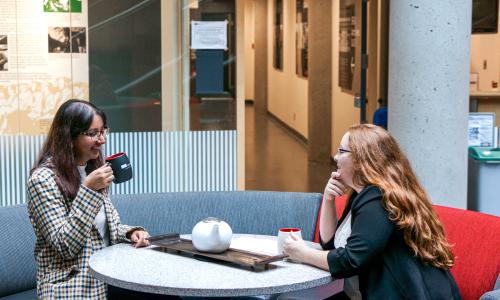
Working on a team can be both a curse and a blessing, depending on who you are working with, your interest in a project, how well (or not) the team’s individuals mesh together, etc. Group projects in university are one thing, but working on the office team is a completely different ballgame. For one, you’ll be working with these people for a while (so you don’t want to blow off too much steam), and there is a reasonable standard of professionalism to be maintained while working together. You want to use the skills you’ve learned working in a group from university and transfer those lessons to the work environment. Here are five tips on how to do that successfully.
ESTABLISH RELATIONSHIPS
Often times, especially if you’re new to the job, it’s hard to know everyone’s likes and dislikes and their personalities. An easy thing to do is to walk by their offices and have a quick chat, perhaps introducing yourself and engaging in small talk. Looking around their office will also allow you to get some basic understanding of what they like/dislike, and using this knowledge in a team setting can show that you are genuinely interested in your coworkers interests. You want to make a good impression when you’re new to the job, so even the little things like saying ‘good morning’ to people walking by your office can make for a more successful time at the office.
QUESTION IDEAS (RESPECTFULLY)
Everyone has ideas and opinions, and sometimes everyone thinks they are right too. As a new employee, you may think you are limited in what you can say. However, many employers (especially co-op employers) are keen to hear your questions about a project, even if you may be younger than other people on the team. After all, bringing new ideas to the table could have been one of the reasons you were hired. While staying silent may seem like a safer alternative, it can often be misconstrued as implicit consent. Questioning ideas, especially as a new employee, can give you a large boost in confidence, even if your ideas don’t end up being implemented. Coworkers may respect your opinion more too, as people are generally inclined to hear feedback about their work.
HELP OTHERS’ ENDEAVOURS
In a workplace setting, there is usually never a moment of static activity. Projects need to be done, focus groups need to be formed, issues need to be worked out, etc. In your role as a new employee, you may think that ‘butting’ into these established teams can further minimize their progress. However, there is nothing wrong in asking if there is any way you can help. You might end up jumping into a new opportunity that you never expected by doing so. In addition, if your offer to help is received with a ‘yes’, then you are on your way to help establish yourself on the team. And once you have accepted the call for help, make sure to finish your tasks on time. This shows initiative and commitment, both of which are ingredients to positive success in the workplace.
ACTIVELY LISTEN
Meetings are important to the organization’s wellbeing. For this reason, it’s critical that you actively listen to the conversation(s) taking place. Even if an update might not pertain to your role, having awareness of other projects can give you an advantage in understanding the work style of the organization, as well as what it aims to accomplish. Consistent practice of this could make you a better leader, even while you’re completing different tasks. Listening is just as important as the actions you might be suggesting, so remember to always have an ear open.
BE CRITICAL, CONSTRUCTIVELY
The best way to deliver criticism is through improvements and suggestions. So, don’t focus on the problems with the end product. Instead, take a look at the process of how a co-worker may have got to that point and then kindly point out changes to be made. This may emphasize your maturity (even as a new employee), and allow for a comfortable common ground where issues with projects can be openly discussed in a non-hostile manner.
CLOSING THOUGHTS
This, of course, is just skimming the basics of successfully working collaboratively in the professional workplace, but hopefully some of the content presented here provided you with useful information for your next team-based endeavour. Best of luck with your new office experience!
Beyond the Blog
-
Check out this section on The Daily Muse, where you can find lots of useful articles on team culture and the best way(s) to effectively manage a work team














